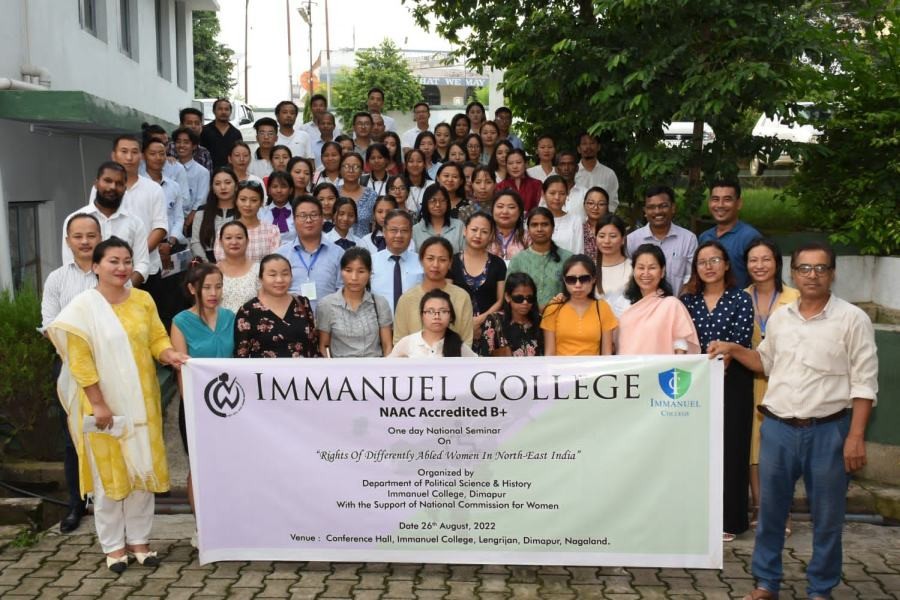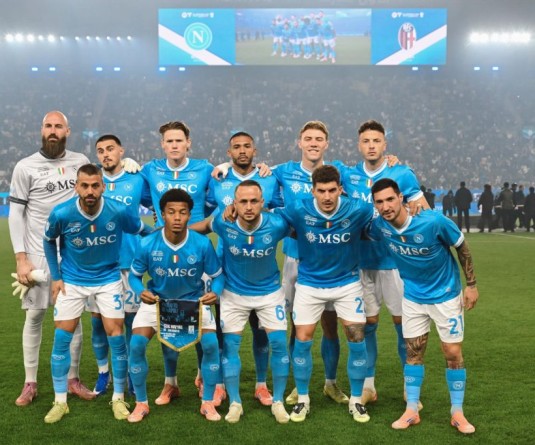Participants of the national seminar on the ‘Rights of Differently-abled Women in North East India. (Morung Photo)

Morung Express News
Dimapur | August 26
A paradigm shift in attitudes and approach towards persons with disabilities (PwDs) is needed in Nagaland and India in general, and the onus is on the young people to make the shift happen, Dimapur Deputy Commissioner Sachin Jaiswal said on Friday.
Addressing a one-day national seminar on the ‘Rights of Differently-abled Women in North East India (With special reference to Nagaland),’ at Immanuel College, Dimapur on August 26, DC Jaiswal noted that Nagaland has been comparatively been faring well in terms of citizens’ rights. However, when it comes to the rights of persons with disabilities, there is still much that needs to be done.
The DC noted that there are various sociological, psychological as well as infrastructural gaps that need to be addressed at every strata of the society.
In terms of sociological, psychological aspects, DC Jaiswal observed that social stigma, in the form of attributing disability with ‘curses’ remains a major factor that deters families from providing educational or employment opportunities to members with disabilities.
In the context of infrastructural gaps, the DC pointed out that even the Deputy Commissioner’s office in Dimapur as well as other offices was not disabled friendly in many aspects. “We have to accept that a lot still has to be done,” he said.
Among others, DC Jaiswal also underscored that various social benefit schemes targeting PwDs have not been reaching the beneficiaries, and many are still unaware or have access to facilities such as Disability Certificates.
Stating that the society cannot just wait around for PwDs to voice out their grievances or challenges, he instead suggested that the society at large should acknowledge and discuss about the discrepancies and find ways to reduce the gaps.
Along these lines, keynote speaker K Ela, Director, Prodigal’s Home, Dimapur also noted that there is not much visibility of PwDs in the Naga society. Sharing her experience of working with PwDs in the last few decades, Ela observed that discrimination is still prevalent in the state, not just in schools or workplaces, but also in the homes.
In the case of women with disabilities, she underscored that many of them are violated and abused and often out on the streets, and very little is done to help them. While women face discrimination in various aspects of life, women with disabilities face double the challenges, she maintained.
In this scenario, Ela emphasized that it was the duty of not only the NGOs, organisations or government agencies to alleviate the plight of PwDs. Rather, the whole society should acknowledge their rights and ensure that they have what they need as capable and productive members of the society.
During the seminar, six papers dealing with various aspects of legal provisions such as the Rights of Persons with Disabilities (RPwD) Act 2016 as well as constitutional provisions that guarantee the right to life, education, etc., in context of the disabled community were presented.
In the first technical session, Loli Athisü, an Assistant Professor at the Department of Political Science, Immanuel College, presented on ‘Right to Education and Women with Disabilities,” where he highlighted, among others, the gender disparity in literacy rate among the disabled and the factors that lead to low enrolment of disabled girls in educational institutions.
Khrutalu Dozo, Head of Department of Political Science and Bendang Jamir, Asst Prof, Department of Political Science gave a presentation on the ‘Right to employment concerning women with disabilities with special reference to Nagaland.’ In the Naga context, they viewed that the generalized notion that PwDs need ‘our charity or sympathy’ should be done away it, and PwDs should be treated as subjects of rights.
In his presentation titled ‘Human rights, women with disabilities and its rights and entitlements,’ Panel lawyer and District Project Assistant, Dimapur District Legal Services Authority Sangto Longchar elaborated on the Rights of Persons with Disabilities Act, 2016.
In the second technical session, Program Coordinator of the Office of the State Commissioner for Persons with Disabilities, Nagaland and General Secretary of Nagaland State Disability Forum Ashe Kiba dwelt on how current legislative, administrative and policy efforts do not link gender and disability in a meaningful way. As a disabled activist, she also emphasized on how awareness raising programmes should be designed to change the societal perceptions especially for women living with disabilities.
Dr Karilemla of the Savitribai Phule Pune University, Pune, in her presentation ‘Older Women with Disabilities and Well-Being’ argued that gender framework based on the prevailing stereotype in society plays a crucial role in neglect, abuse and violence in older women with disabilities.
Stating that the most hidden form of abuse is the sexual assault of older women with disabilities, she noted that voices of older women with disabilities are not only suppressed and ignored when it comes to respecting the dignity of human rights; it could be considered as underreported or unreported crimes. The ‘silent and missing voices’ have yet to be resounded through crowd mobilization, public debate, and mass media, she added.
Meanwhile, Imjungla Imchen, Asst Prof, Department of History while presenting on ‘Violence against women with disabilities in Nagaland’ highlighted various ways of identifying the abused and the abuser and how factors like inadequate policies and standards, negative attitudes, physical access, information availability, etc, make it inaccessible for women with disabilities to report abuse and other offences committed against them.
The seminar, which was organized by the Department of Political Science and History, also featured interactive Q & A sessions between paper presenters and the audience. It was sponsored by the National Commission for Women.


.jpg)


